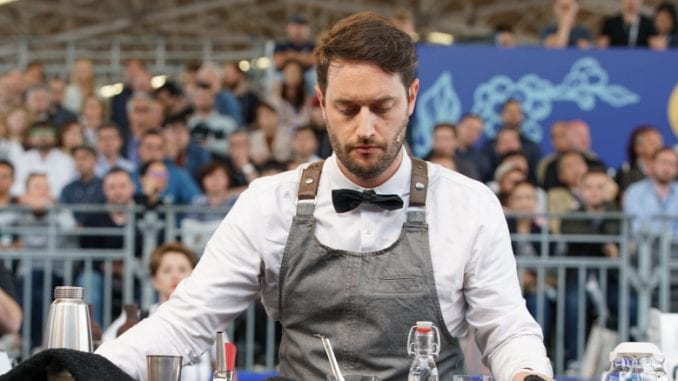
Five years ago, Mathieu Theis was a engineer. A transformative coffee experience brought him into the specialty world; now he’s the two-time Swiss barista champion and third-place finisher at this year’s WBC.
BY ASHLEY RODRIGUEZ
BARISTA MAGAZINE ONLINE
Photos courtesy of World Coffee Events
If you looked up Mathieu Theis, the two-time Swiss barista champion and third-place finisher at this year’s World Barista Championship in Amsterdam, five years ago, you would have found an engineer with no real interest in coffee. Now, he owns a shop called MAME in Zurich with his partner (and fellow competitive barista) Emi Fukahori, where they work to make coffee as welcoming and approachable as possible. Mathieu applied this to his routine, and he talks about creating a unique experience for the judges and his hopes for the future of competition.
Ashley Rodriguez: What did you do before you started in coffee?
Mathieu Theis: I used to work as an engineer managing energy consumption for building and offices—so not really into coffee. But I was always interested in good food, drinks, enjoying life. For me, eating or drinking was never to get my daily calories, but was very often a moment to enjoy, especially if the food or drink is delicious.
Five years ago, I entered a specialty coffee shop in Zurich where I lived, and the barista served me an espresso I will never forget. He explained to me that each sip has a different flavor; the first sip was chocolaty, second sip vanilla, and last sip nutty. At the beginning I thought the barista was high on something or must be joking!
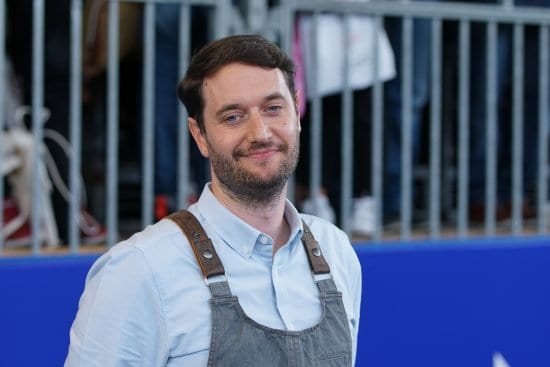
I drank the espresso and got exactly what he said. At that moment, I fell in love with specialty coffee. I thought, how can coffee taste this delicious and complex? Then two years ago, I decided together with Emi Fukahori, my partner in life and business, to resign from my engineer job and open a coffee shop called MAME in Zurich. The idea is we do not want to compromise on quality for espresso or filter, but still offer a large menu to cover maximum flavors from chocolaty to fruity and floral so that everybody can choose a coffee that he or she likes.
Our slogan is, “The best coffee is the coffee that you like.” We bring our expertise from barista competitions but never force customers on what they should drink. We listen and choose together.
AR: Why did you decide to compete? What did it feel like representing Switzerland?
MT: I competed because of Emi. In 2015, she won the Swiss Barista Championship and I asked her to help me for 2016. She told me that I wasn’t good enough to compete. That stung me so much that I trained like hell and won the Swiss Barista Championship the next year in 2016. From that moment, we stopped fighting against each other but rather teamed up.
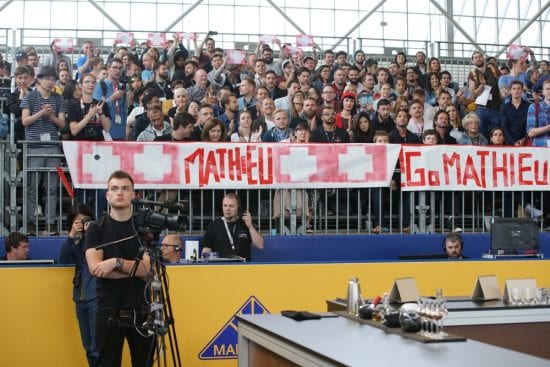
Once I started to compete, I was so happy with everything I was learning. It’s such a journey every time—that’s what keeps me competing. I also know more baristas thanks to competition; I love to see them at these events.
Representing Switzerland is particular because we are a small country not necessarily used to placing highly at WBC. But the scene is growing and we get more and more support, which makes me want to make Switzerland proud. We are small but we can make very good coffees!
AR: Can you tell us about the coffee you used? How did you find it, and what message about the coffee (and coffee in general) did you want to tell your judges?
MT: In my national competition, I used a coffee from Bolivia, a Caturra variety roasted by Coffee Collective from the shelf. I loved the idea to take an unexpected coffee that surprises the judges.
For WBC, I wanted to do the same so I chose a coffee from Costa Rica that was Caturra and Red Catuai varieties. The interesting thing about this coffee is the process. It’s a natural anaerobic fermentation. That means the whole cherries are placed in a tank full of water and then sealed for 20 hours, starting a fermentation process that produces this unique note of cinnamon.
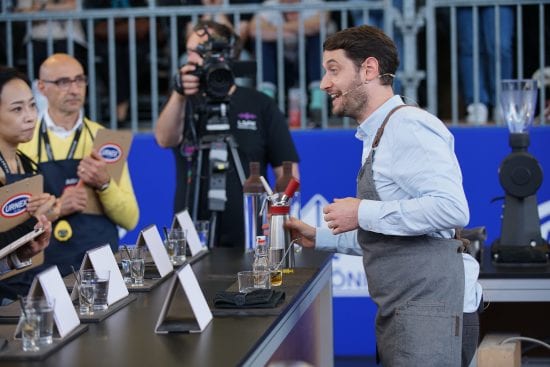
I wanted to go back to the root of my first espresso. No crazy innovations—just a delicious coffee served with all the care to the judges. I discovered in my shop that emotions play a big role with coffee. We all had that experience of a customer entering the café a bit sad, and you served them a delicious coffee and they smile. Coffee creates happiness.
To focus the judges, I asked them to close their eyes for a short meditation and guided them while drinking the espresso through the entire experience. This exercise makes your espresso tasting much more inclusive. All of a sudden you are not only drinking a coffee but you feel every aspect of it: the texture, the acidity, the sweetness, the temperature, the touch of the cup …
AR: What expectations did you have going into WBC? What did you hope to gain from this experience?
MT: I had mixed expectations—on the one hand I participated in 2016 in Dublin and ended up 50th. So making semifinals was for me already a big achievement. On the other hand, my coach, Ben Put (four-time WBC competitor) was convinced I could go to the finals, but I thought he said this just to motivate me. So being in the finals and placing third among amazing barista such as Aga, Lex, and John, I was stoked. Being part of this crazy finals was an experience I will never forget.
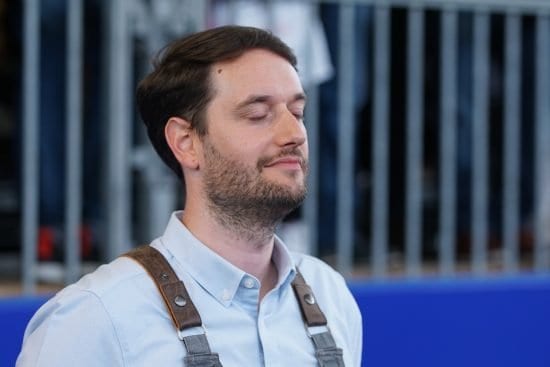
AR: How was this competition experience different from your previous ones? Will you compete again?
MT: I’ve been competing since 2015, but this is my second time at WBC. This year was very different because I knew what I wanted to do. In 2016, I was easily distracted by other baristas that I wanted to connect with or by cuppings organized during WBC. I’d like to compete with Ben because, as I mentioned to him, we truly enjoyed the time we spent together. Not sure if I will compete directly in 2019 as I’m training Emi for the World Brewers Cup this year.
AR: Tell us a little more about the coffee scene in Switzerland. How have you seen it change and what do you hope to see in the future?
MT: The scene in Switzerland is booming right now—in Zurich there are at least 10 specialty coffee shops, but also in other cities like Basel, Saint Gallen, Lausanne, and Geneva. There is a younger generation of baristas who want to change Swiss coffee habits and replace them with more flavorful espressos and introduce pourover, which is still very new for us. It’s part of a larger movement that also encompasses craft beer, innovative restaurants, and good designer shops. The Swiss now aim for better quality and products made locally.
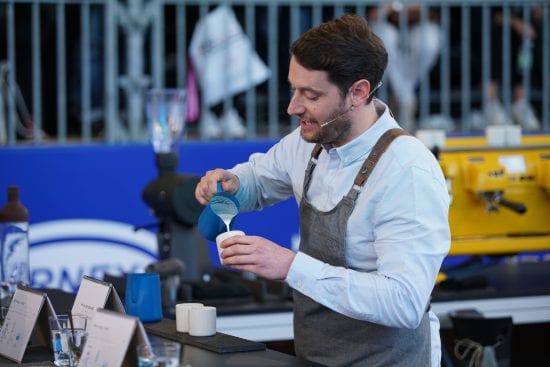
I think the future is bright as the new generation seeks better-quality foods and beverage; it’s a wonderful opportunity for specialty coffee.
AR: How was competition for you in general? Are you usually calm during competition or are you nervous? Do you have any traditions or routines or a way you prepare for competition?
MT: Competition was very fun but also stressful. I’m usually very calm, but in the final round I was very afraid I’d make a stupid mistake. So I was very slow in my routine. To help me, before doing my show I mentally pictured positive things.
AR: Do you have any advice for current and future competitors?
MT: My biggest advice is to enjoy the training time before the competition because this is when you learn, make friendships, and have fun. In the end, the friendships made during training will last longer than titles at the competition.
AR: Is there anything you want people to know about you or about coffee in Switzerland?
MT: If someone needs any help regarding barista competitions, I will always try to help. Coffee is about sharing, so I always try to answers any questions. And I invite anyone to discover the coffee scene in Switzerland—we are fun, very social, we connect with our customers, and we are always open to talk about coffee!

